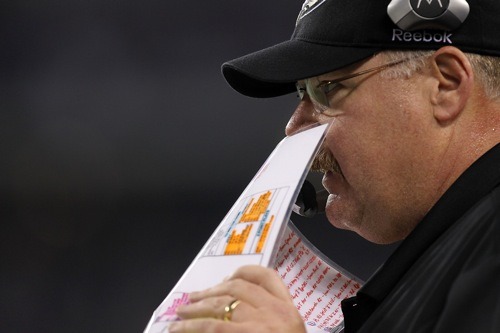
If you so desire, you can read instant draft grades written by numerous experts around the NFL world. Many scouts and reporters throw out their opinions immediately following the conclusion of the draft, telling fans what picks they love or hate and which teams made the most of their draft picks.
Unfortunately, most of this analysis is entirely worthless. Obviously, it’s impossible to judge any of these players before they take a single NFL snap. If we could, no one would have wasted tens of millions of dollars on guys like JaMarcus Russell and Ryan Leaf.
But draft grades also bother me because most of the grades are based on silly determinations that a player is a “steal” or a “reach.” It’s common to read analysis about how a team was lucky that X player dropped to them in the draft, such as Jeremy Maclin to the Eagles in 2009. Conversely, people will argue that teams picked a player too early. This year, Paul Domowitch of the Philadelphia Daily News chided the Eagles for prematurely drafting safety Jaiquawn Jarrett and kicker Alex Henery.
What are these assertions based on? These reporters and scouts certainly don’t have some omnipotent knowledge that eludes NFL organizations. Perhaps the teams even know more than these backseat-driving writers. For example, many observers laughed when the Oakland Raiders picked safety Michael Mitchell out of Ohio University, whom few had heard of before, in the second round of the 2009 draft. Then later that day it came out that the Chicago Bears had been targeting Mitchell only two picks later. While teams may be largely in the dark about their opponents’ intentions, they most likely have more information than the so-called “experts.”
Furthermore, every draft pick is a “reach.” Read up on auction theory, specifically so-called Dutch auctions, in which the auctioneer starts with an expensive price and slowly lowers it. The first person who is willing to pay for the item gets it. This is analogous to the draft, where the team that values a player the most will pick him the highest. Especially with a lot of bidders (32 teams in the draft), the “winner’s curse” can be substantial — essentially, everyone is overpaying.
I don’t mind if you want to talk about who you like, who you don’t, and who you wish the Eagles had drafted. But let’s move on from this draft grade talk about steals and reaches. It’s just misguided.
Originally published at NBC Philadelphia. Photo from Getty.